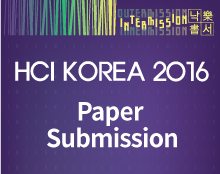Keynote Speech|
Prof. Steve Benford
- SUBJECT :
- Designing With Discomfort
- DATE :
- 27 January 2016 (Wed)15:00 ~ 14:00
Abstract :
The traditional tenets of HCI are grounded in making the user’s interactions with computers as comfortable – efficient, ergonomic, satisfying, legible and predictable – as possible. However, as HCI increasingly turns its attention to cultural uses of computing, from highbrow arts to mainstream entertainment, so the game is changing. Our experience of artworks is often far from comfortable. Our engagements with games and sports may push our minds and bodies to the limit. I will therefor set out an argument for deliberately and systematically designing with discomfort in order to deliver powerful cultural experiences. I will identify the potential benefits of uncomfortable interactions under the general headings of entertainment, enlightenment and sociality. I will review a series of artworks and performances that have deliberately employed discomfort to create unusually powerful and provocative interactive experiences. By reflecting on these and other examples, I will articulate a suite of tactics for engineering four primary forms of discomfort in interactive experiences - visceral, cultural, control and intimacy. I will reveal how moments of discomfort need to be embedded into an overall experience which ultimately resolves them, requiring a further consideration of the dramatic acts of exposition, rising action, climax, falling action, and dénouement. Finally, I will consider an ethical framework for designing uncomfortable interactions, revisiting key ethical issues such as consent, withdrawal, privacy and risk.
Bio :
Steve Benford is Professor of Collaborative Computing in the Mixed Reality Laboratory at the University of Nottingham. His research explores unusual interactions for cultural and creative experiences and involves working with artists to create, tour and study interactive performances from which he generalises provocative design concepts. He has received best paper awards at the ACM’s annual Computer-Human Interaction (CHI) conference in 2005, 2009, 2011 and 2012 and been awarded the 2003 Prix Ars Electronica for Interactive Art, the 2007 Nokia Mindtrek award for Innovative Applications of Ubiquitous Computing and received four BAFTA nominations. He was elected to the CHI Academy in 2012. His book Performing Mixed Reality was published by MIT Press in 2011. He has previously held an EPSRC Dream Fellowship and been a Visiting Professor at the BBC in 2012 and a Visiting Researcher at Microsoft Research in 2013.
Prof. Patrick Baudish
- SUBJECT :
- Five challenges for personal fabrication
- DATE :
- 28 January 2016 (Thu)11:00 ~ 12:00
Abstract :
"I believe that computer science and mechanical engineering are about to unite. In the future, users will build machines and solve mechanical problems by digitizing the involved objects using 3D scanners, solving the problem in the digital domain using the means of computer science, and converting the result back to the mechanical domain using a 3D printer. This will allow solving mechanical problems with the effectiveness and efficiency of computer science. This will not only change mechanical engineering, but also allow computing to reach its next phase, which is to merge into matter itself, where the physical matter of objects will also perform the computation. In this talk, I will take a closer look at this unification process and try to point out the five grand challenges it brings for researchers in the field of human-computer interaction and in particular personal fabrication"
Bio :
Patrick Baudisch is a professor in Computer Science at Hasso Plattner Institute at Potsdam University and chair of the Human Computer Interaction Lab. After a long history in natural user interfaces, mobile devices, and touch input, his current research focuses on interactive fabrication. Previously, Patrick Baudisch worked as a research scientist in the Adaptive Systems and Interaction Research Group at Microsoft Research and at Xerox PARC. He holds a PhD in Computer Science from Darmstadt University of Technology, Germany. He was inducted into the CHI Academy in 2013 and has been an ACM Distinguished Scientist since 2014.
Prof. Jun-Ho Oh
- SUBJECT :
- DATE :
- 29 January 2016 (Fri) 09:00 ~ 10:00




